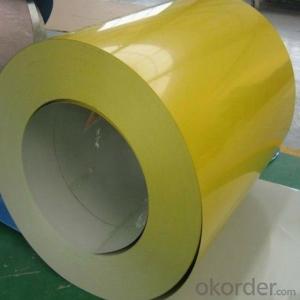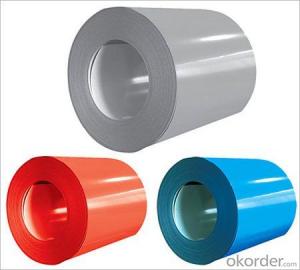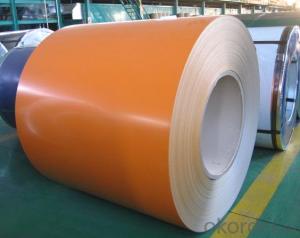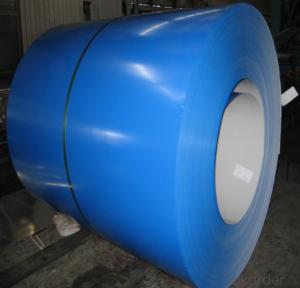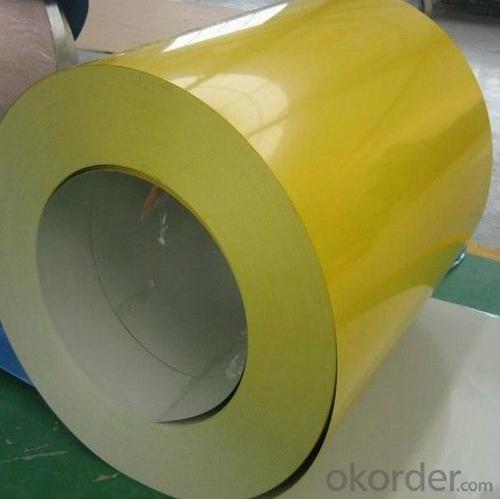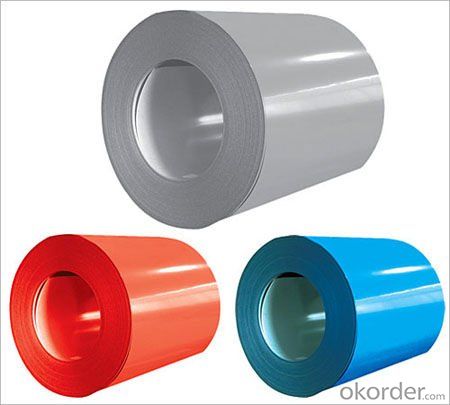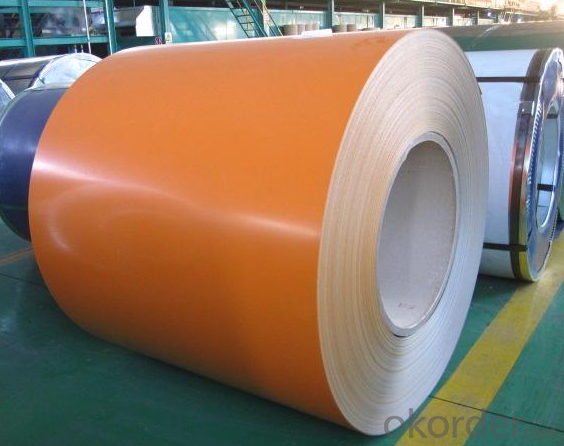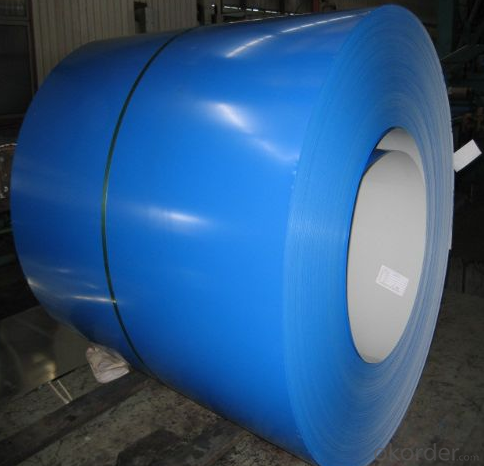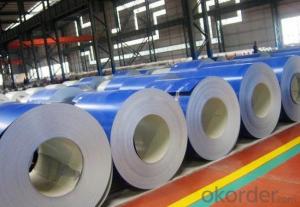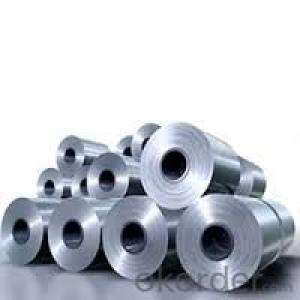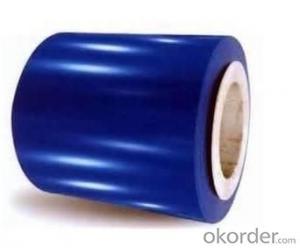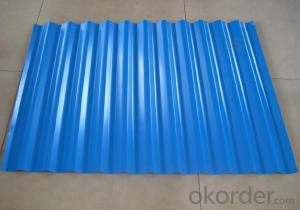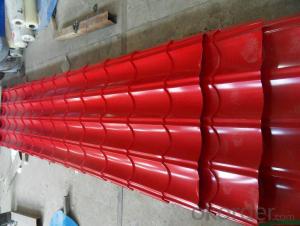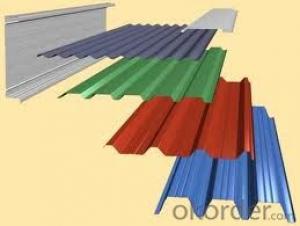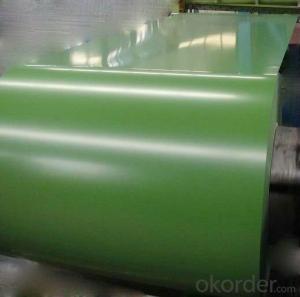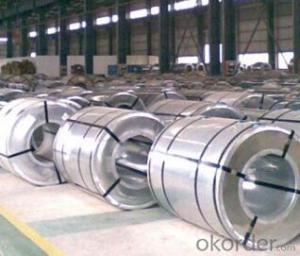Painted Galvanized Steel in Coils for Roofing
- Loading Port:
- China main port
- Payment Terms:
- TT OR LC
- Min Order Qty:
- 25 m.t.
- Supply Capability:
- 100000 m.t./month
OKorder Service Pledge
Quality Product, Order Online Tracking, Timely Delivery
OKorder Financial Service
Credit Rating, Credit Services, Credit Purchasing
You Might Also Like
1) AVAILABLE DESIGNATION OF (Prepainted galvanized steel coils) printed PPGI coils
| Quality | Q/BQB 440-2003 | JIS G3312-1994 | EN 10326-2004 | ASTM A653-02a |
| EN 10327-2004 | (BASE PLATE) | |||
| (BASE PLATE) | ||||
| Commercial Steel | TDC51D | CGCC | DX51D+Z/AZ | CS Type A/B/C |
| Forming Steel | (TSt01,TSt02,TSt03) | CGCD1 | FS Type A, Type B | |
| Drawing | TDC52D /TDC53D | - | DX52D+Z/AZ | DDS TYPE A/C |
| Steel | DX53D+Z/AZ | |||
| Structural | TS280GD(TStE28) | CGC400 | S280D+Z/AZ | SS275 |
| Steel | TS350GD(TStE34) | CGC440 | S350D+Z/AZ | SS340 Class1 |
2) OUR SPECIFICATION OF (Prepainted galvanized steel coils) printed PPGI coils
Available Size:
| Manufacturer | Thickness | Width | Length of plate | Inner diameter of coil |
| JIANGSU HUIYE STEEL SHEET CO.,LTD | 0.2-1.2mm | 800/914/1000/1200/1219/1250mm | 1000-6000mm | 508mm/610mm |
Coated Mass OF (Prepainted galvanized steel coils) printed PPGI coils:
| Base plate | Available Coated Mass(g/m^2) |
| Galvanized Steel | 80, 100, 120, 160, 180 |
| Galvalume Steel | 50, 70, 150 |
Available Painting OF (Prepainted galvanized steel coils) printed PPGI coils:
| Category of Painting | Item | Code | |
| Polyester | PE | ||
| High-durability polyester | HDP | ||
| Silicon modified polyesters | SMP | ||
| Polyvinylidene fluoride | PVDF | ||
| Easy-Cleaning | — | ||
| Painting Thickness | Top side: 20+5microns; | ||
| Bottom side: 5~7microns. | |||
| Color System | Produce according to RAL Color System or as per buyer’s color sample. | ||
| Painting structure | Top surface | Bottom surface | |
| Primer coating | No coating | 1/0 | |
| Primer coating | Primer coating | 1/1 | |
| Primer coating + Finish coating | No coating | 2/0 | |
| Primer coating + Finish coating | Primer coating or single back coating | 2/1 | |
| Primer coating + Finish coating | Primer coating + Finish back coating | 2/2 | |
Note: Protect film available
3) APPLICATION OF OUR (Prepainted galvanized steel coils) printed PPGI coil
| Construction | Outside | Workshop, agricultural warehouse, residential precast unit, corrugated roof, roller shutter door, rainwater drainage pipe, retailer booth |
| Inside | Door, doorcase, light steel roof structure, folding screen, elevator, stairway, vent gutter | |
| Electrical appliance | Refrigerator, washer, switch cabinet, instrument cabinet, air conditioning, micro-wave oven, bread maker | |
| Furniture | Central heating slice, lampshade, chifforobe, desk, bed, locker, bookshelf | |
| Carrying trade | Exterior decoration of auto and train, clapboard, container, isolation lairage, isolation board | |
| Others | Writing panel, garbage can, billboard, timekeeper, typewriter, instrument panel, weight sensor, photographic equipment | |
- Q: I got my dog those nice looking stainless steel water and food bowls (looks great next to my kitchen appliances...haha). The thing is my dog will drink from the toilet or a plastic bowl but not out of his bowl...I was wondering if those stainless steel bowls change the taste of food and water?
- Well, I know the water at this restaurants where they use metal pitchers taste a bit off to me. There's nothing wrong with the water, but I think the metal pitcher throws off the flavor. Could be the same with the metal bowl and the dog. Plastic is only a problem at hiding bacteria if it gets scratched up badly (which isn't as likely to happen with water as long as the dog doesn't chew it. You can also put the plastic crock bowls on the top shelf of a dishwasher for cleaning as the heat kills most germs.
- Q: How are steel coils inspected for hardness?
- Various methods are used to inspect the hardness of steel coils, ensuring their quality and suitability for specific applications. The Rockwell hardness test is a common method, involving the use of a diamond or ball indenter pressed into the coil's surface to measure indentation depth. The hardness value is then determined based on this measurement. Another method is the Brinell hardness test, which uses a hardened steel or tungsten carbide ball indenter to create an indentation on the coil's surface. The diameter of the indentation is measured, and the hardness value is calculated using a formula that considers the applied load and indentation diameter. On the other hand, the Vickers hardness test utilizes a pyramidal diamond indenter to create an indentation on the coil's surface. The lengths of the indentation diagonals are measured, and the hardness value is calculated using a formula that takes into account the applied load and diagonal lengths. In addition to these traditional methods, modern technology has introduced non-destructive testing techniques such as ultrasonic testing and eddy current testing. Ultrasonic testing involves transmitting ultrasonic waves through the coil and measuring the time it takes for the waves to return. Changes in the wave pattern can indicate variations in hardness. Eddy current testing, on the other hand, uses electromagnetic induction to detect changes in electrical conductivity, which can be correlated to hardness variations in the steel coil. Overall, steel coils undergo thorough inspection using a combination of traditional and advanced techniques to ensure their hardness meets the required specifications. These inspections are vital in maintaining the quality and dependability of steel products in various industries.
- Q: How are steel coils used in the manufacturing of body panels?
- Steel coils are used in the manufacturing of body panels by being processed and shaped into flat sheets or strips. These sheets or strips are then further formed, cut, and welded to create various body panels, such as doors, hoods, and fenders, which are essential components of vehicles.
- Q: I need to know the density of steel as one of my physical properties of steel. Any answers? If u have more physical or chemical properties of steel, that would help to thanks.
- The short answer to your question is that the density of plain mild steel is 7.85. The long answer is that depending on where you look, or the grade of steel that you are talking about can change this value. A density of 7.88 is often quoted for mild steel as well. If you add alloying elements such as tungsten, chrome or manganese to improve the steel, the density will change. So the long answer is that the density of steel can vary between 7.75 and 8.05.
- Q: I have a job where I'm required to wear ANSI certified steel toed boots or shoes(so long as its ANSI). Thing is, I'm a vegan. I do NOT want to buy leather, and I will go to great lengths to buy a non leather shoe/boot I can wear on the job! I AM currently borrowing my dad's leather ANSI boots, but would very much love to be able to rock a pair of cruelty free boots/shoes on the job!It does not have to be certified vegan just all man-made materials and no leather/sued and other such stuff where animals have to die. It would make me no better than the massive slaughterhouse industries and such. Valueing money of ver live/morals. I don't want one of the first things I need to do in my manufacturing job is compromising my morals. :3So if you know of an ANSI vegan friendly boot brand PLEASE TELL ME! *gets on knees begging*Money isn't really an option for me, I'll just continue borrowing my dad's boots till I save up enough!Thanks in advance! :D
- This Site Might Help You. RE: Vegan ANSI Steel Toes? I have a job where I'm required to wear ANSI certified steel toed boots or shoes(so long as its ANSI). Thing is, I'm a vegan. I do NOT want to buy leather, and I will go to great lengths to buy a non leather shoe/boot I can wear on the job! I AM currently borrowing my dad's leather ANSI...
- Q: How are steel coils protected from humidity?
- Steel coils are typically protected from humidity through a process called galvanization, where a layer of zinc or another protective coating is applied to the surface of the steel. This coating acts as a barrier, preventing moisture from coming into direct contact with the steel and minimizing the risk of corrosion. Additionally, steel coils are often stored in dry, enclosed spaces or wrapped with moisture-resistant materials such as plastic or wax paper to further protect them from humidity.
- Q: Are steel coils used in appliances manufacturing?
- Yes, steel coils are commonly used in appliances manufacturing. They are widely used for constructing the frames, cabinets, and other structural components of various appliances such as refrigerators, washing machines, dishwashers, and ovens. Steel coils provide strength, durability, and stability to these appliances, making them an essential component in their manufacturing process.
- Q: How are steel coils cleaned before use?
- Before being used, steel coils undergo a process called pickling to ensure their cleanliness. Pickling is a chemical treatment that eliminates impurities, scale, rust, and other contaminants from the surface of the coils. Initially, the coils are immersed in an acid bath, typically containing a mixture of hydrochloric acid and sulfuric acid. This acid solution effectively dissolves any rust, scale, and impurities present on the surface. The duration of immersion varies depending on the level of contamination and the desired level of cleanliness. After pickling, the coils undergo a thorough rinsing with water to eliminate the acid solution and any remaining residue. This step is crucial to prevent further corrosion or chemical reactions. Once rinsed, the coils are often dried to remove any remaining moisture. This can be achieved through air drying, using high-pressure air blowers, or passing the coils through heated chambers. After the cleaning process, the steel coils are now ready for use in various applications, such as manufacturing, construction, or any industry that requires high-quality steel products. The pickling process guarantees that the coils have a clean, smooth, and corrosion-resistant surface, enabling them to perform effectively and meet the desired specifications.
- Q: How do steel coils contribute to earthquake resistance in structures?
- Steel coils contribute to earthquake resistance in structures by providing strength and flexibility. When used in the construction of buildings, steel coils can absorb and dissipate the energy generated by an earthquake, preventing it from causing significant damage. The high tensile strength of steel allows it to withstand the lateral forces and vibrations during an earthquake, ensuring the structural integrity of the building. Additionally, the ductility of steel allows it to bend and deform without breaking, further enhancing its ability to withstand seismic activity.
- Q: No. Not Stainless steel, I mean STEEL.Not a specific type, but STEEL.Thanks. xo
- Is Steel A Pure Substance
Send your message to us
Painted Galvanized Steel in Coils for Roofing
- Loading Port:
- China main port
- Payment Terms:
- TT OR LC
- Min Order Qty:
- 25 m.t.
- Supply Capability:
- 100000 m.t./month
OKorder Service Pledge
Quality Product, Order Online Tracking, Timely Delivery
OKorder Financial Service
Credit Rating, Credit Services, Credit Purchasing
Similar products
Hot products
Hot Searches
Related keywords
